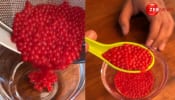Washington: A synthetic derivative of vitamin D can collapse the barrier of cells shielding pancreatic tumours, making the seemingly impenetrable cancer susceptible to therapeutic drugs, scientists say.
"While the success of this drug in humans with pancreatic cancer is still unclear, the findings in animal studies were strong, raising hope that ongoing clinical trials will give people with this terrible disease hope for a truly new type of therapy," said Ronald Evans, director of Salk Institute's Gene Expression Laboratory and senior author of the new paper.
Evans and colleagues knew that the ability of the pancreatic tumour to communicate with nearby cells -- called the tumour microenvironment - is key to its growth.
Tumour cells send out signals that make the microenvironment inflamed and dense; this "living shield" around a tumour not only helps the cancer grow, but blocks the access of immune cells and chemotherapeutic drugs.
"There was evidence that the activation of the microenvironment was theoretically reversible, but nobody knew exactly what was responsible for the activation, making it hard to turn off," said Salk postdoctoral research fellow Mara Sherman, first author of the new paper.
Sherman, Evans and their collaborators focused their attention on one component of this wall: pancreatic stellate cells, which usually respond to small injuries by briefly switching to an activated state, spurring new cell growth.
In the case of cancer, however, the stellate cells near a tumour - in response to signals from the tumour - are constantly turned on.
This chronic activation of the stellate cells provides the tumour cells with extra growth factors and therefore helps them proliferate, but also forms a wall-like barrier around the tumour that protects it from chemotherapeutics and other cancer-fighting drugs.
Evans' group had earlier discovered that stellate cells in the liver could be inactivated by a chemically modified form of vitamin D.
They wondered whether the same could hold true in the pancreas. They examined the differences between activated and inactivated stellate cells in the pancreas and found that activated stellate cells near a tumour had high levels of the vitamin D receptor.
When the researchers then added modified vitamin D to activated stellate cells the cells quickly reverted back to a healthy, inactivated state, stopping production of signals that spur growth and inflammation.
Systematic analysis of vitamin D analogues allowed the team to discover a modified form of vitamin D that is more stable, resilient and effective in vitro.
To see whether this new vitamin D-like compound could halt the growth of a tumour, Evans and the team next studied its effectiveness in mice.
The researchers found that combining the drug with existing chemotherapeutics gave a 50 per cent increase in lifespan compared to chemotherapy alone.
















